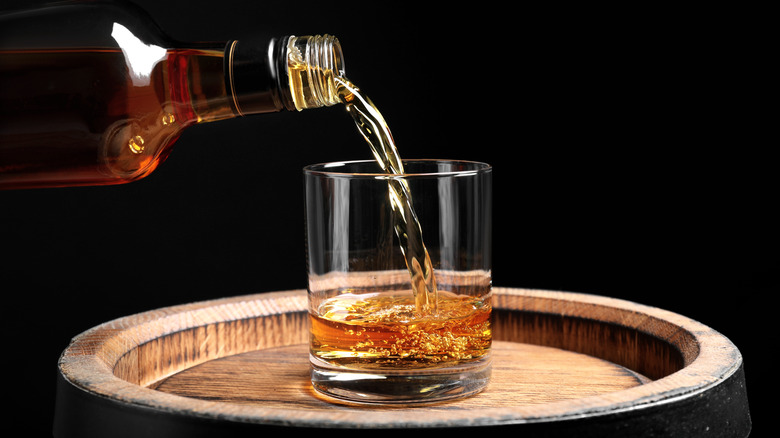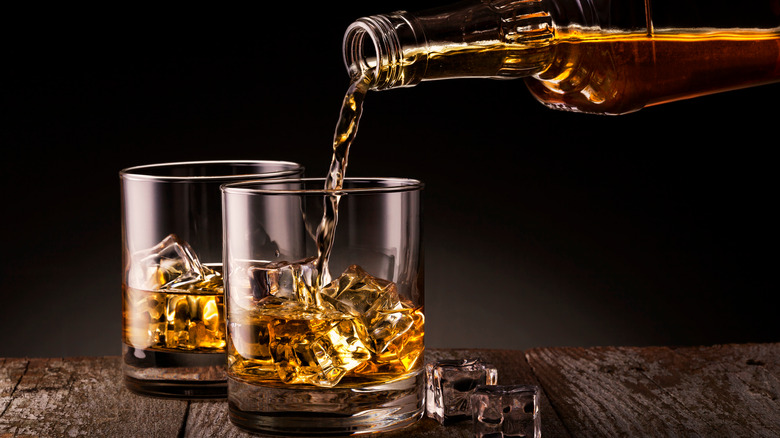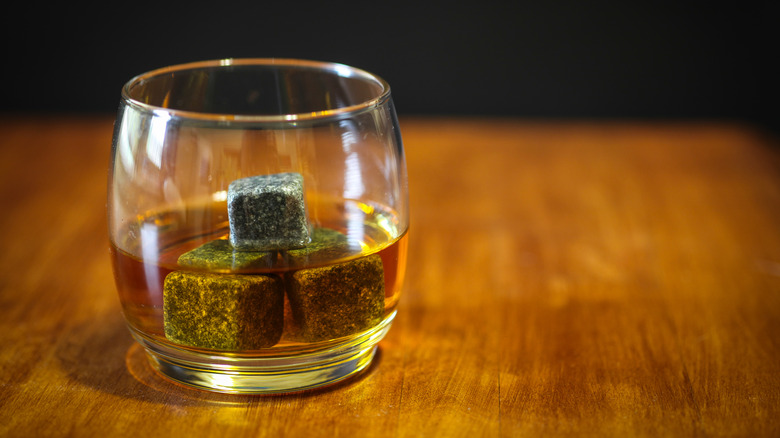Is It Ever Smart To Store Your Whiskey In The Freezer?
Whether you regularly make Old Fashioneds at home or you just like to keep a bottle of whiskey (or whisky, if you prefer) on hand for when the mood strikes, you're going to have to keep that celebrated liquor somewhere before and between uses. A freezer is tempting — you may even have seen other people storing liquor bottles in their freezer and wondered if you should do the same. It's pretty common to store vodka in the freezer, because straight liquor doesn't freeze, it just gets perfectly chilly. While it's not actually considered best practices to store vodka in the freezer (more on that later), it's not complete sacrilege.
Keeping your whiskey in the freezer, however, might raise a distiller's blood pressure. That's because whiskey and other barrel-aged spirits are chock-full of layered flavor notes, and drinking it at lower temperatures will make it more difficult to taste all of them. While chilling your whiskey can help smooth out the ethanol burn, it also smooths over everything else, including the desirable features. To best experience and appreciate a whiskey, especially a good one, you're better off storing it at room temperature.
Whiskey's nuances disappear in the freezer
So, why is it okay to keep vodka in the freezer, but not whiskey? The answer lies in what people like about them. Vodka drinkers tend to like the cleanness of the spirit; plus, if you're drinking a mid-to-low quality vodka, the low temperature can help mask any undesirable flavors. The exception comes if you're drinking a high-end vodka. Those undesirable flavors are less likely to be present in the first place, and over-chilling can cover up subtle but pleasant flavor notes in such a drink. This is why experts often suggest keeping it in the fridge, not the freezer, if you want it to be cold on demand.
With whiskey, this is true tenfold, because whiskey drinkers generally appreciate complexity, not cleanness. A good whiskey is a symphony of flavors and aromas, thanks to its high content of volatiles – volatile organic compounds, like alcohol, esters, and terpenes — which contribute to the sensory experience. Keeping whiskey at very low temperatures will damage and dull your perception of those volatiles, making it less rich, flavorful, and interesting. And if you shelled out for a really nice whiskey, that's the last thing you want.
Keeping your whiskey cool
Like vodka, whiskey won't freeze in a regular home freezer — any spirit that's 80 proof (40% alcohol by volume) or higher would need to get down to -17 degrees Fahrenheit, colder than a standard refrigerator freezer can get, to do so. But even though it won't turn your spirit to slush, a freezer can affect whiskey in other ways. The compounds that give whiskey its array of flavors and aromas can become permanently damaged, as mentioned above; additionally, a cold drink will somewhat numb your tongue, making your taste buds less sensitive. Freezing temps can even mess with the consistency of the whiskey, causing oils and fats that you usually wouldn't notice to solidify and make the spirit viscous and weird instead of nice and smooth.
That said, it's worth acknowledging that not everyone is a connoisseur who sips their whiskey neat — sometimes you just want a drink to be refreshing and cold. Fortunately, most cocktails use ice in some way to chill the beverage. Shaking or stirring with ice and then straining it out or pouring the whiskey over fresh ice in the serving glass both result in a pleasantly cold drink, even though the liquor is starting at room temperature. If you like your whiskey straight, have it on the rocks — or, better yet, invest in a whiskey stone so you can keep the drink cool without diluting it.


